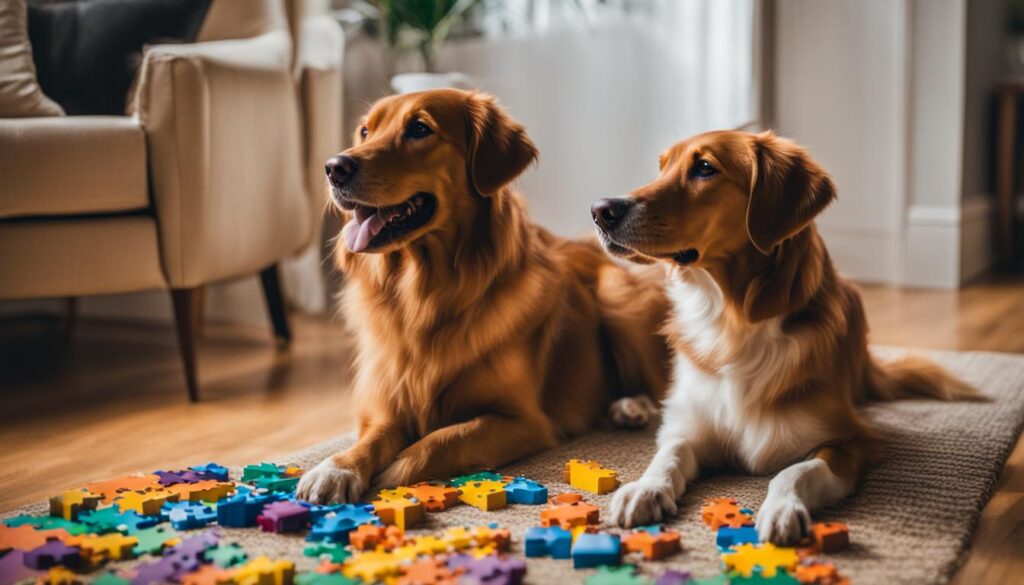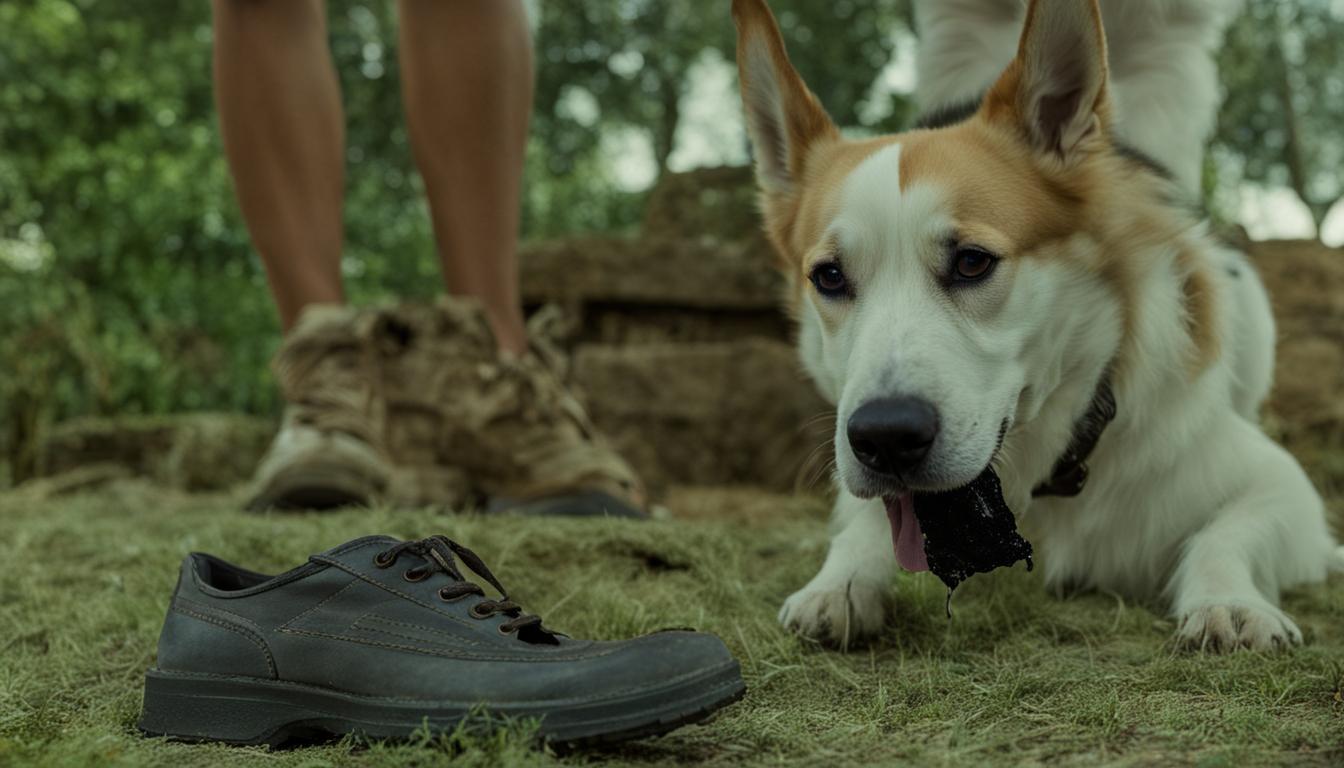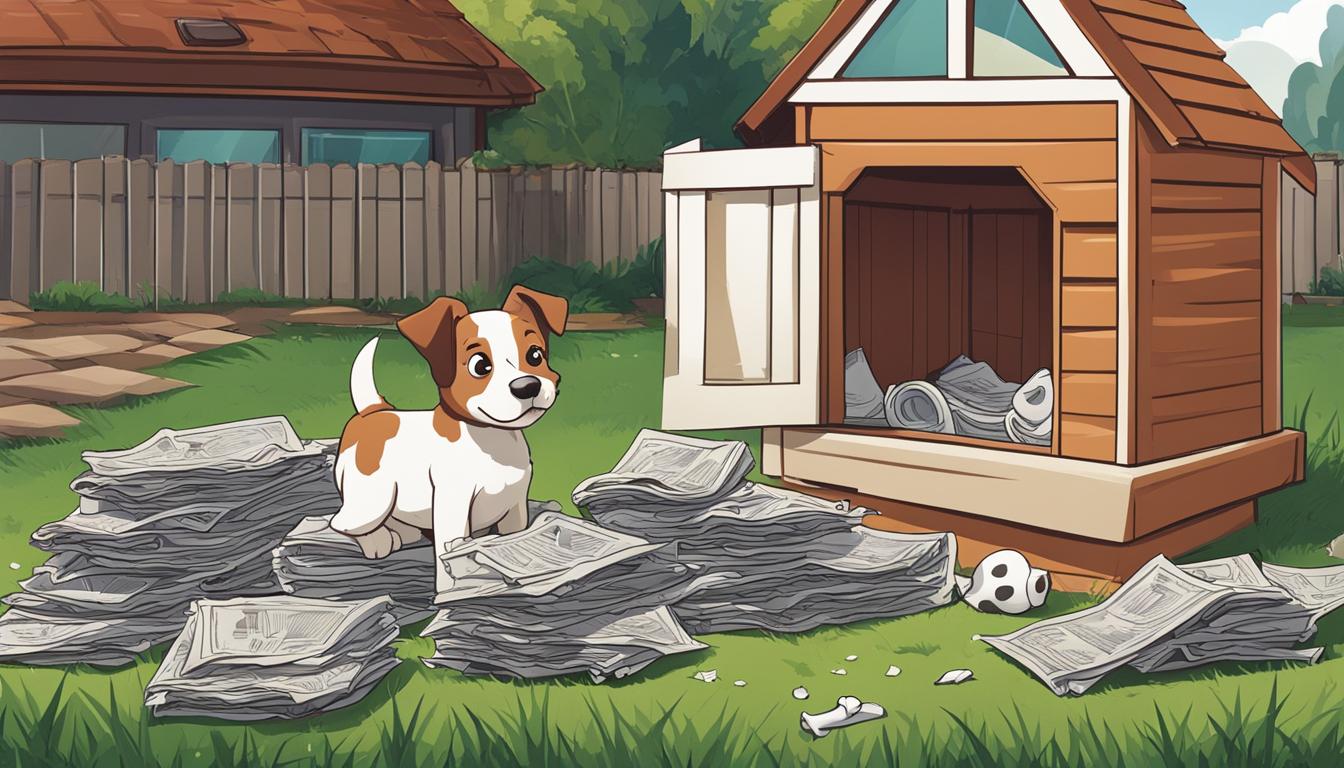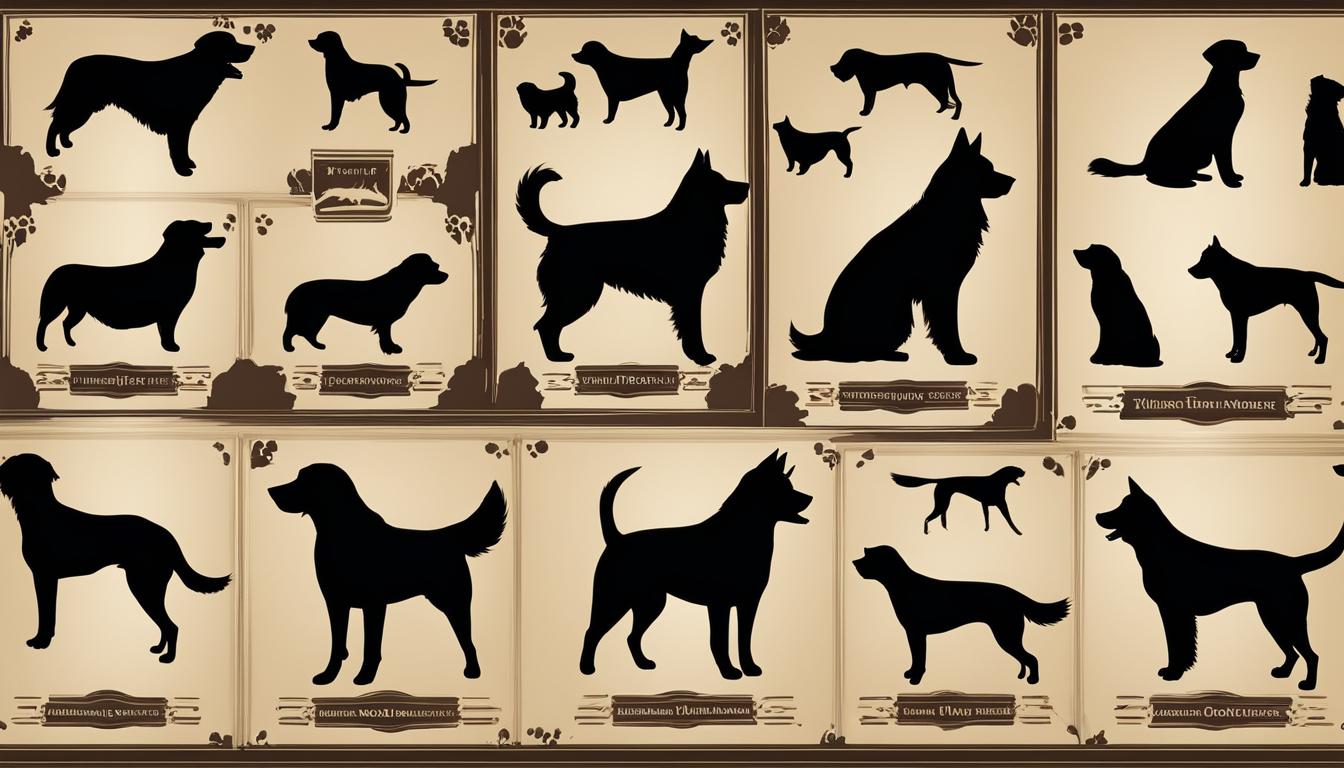Welcome to our guide on dealing with destructive dog behaviors! If you’ve ever come home to find your shoes chewed up or your garden dug up, you know how frustrating it can be. But don’t worry, we’re here to help you understand why your furry friend engages in these behaviors and provide you with effective training techniques to tackle them head-on.
When it comes to managing destructive chewing in dogs, the key is to establish a daily routine that addresses their needs. This includes providing regular exercise, social bonding, playtime, and training sessions. By meeting their physical and mental stimulation requirements, you can help reduce the likelihood of destructive behaviors.
One common destructive behavior in dogs is digging, whether it’s in your beautiful flower beds or your perfectly manicured lawn. Training against this behavior involves redirecting their attention to designated digging areas and using deterrents to discourage them from digging where they shouldn’t.
Reducing destructive behavior in puppies is crucial to setting them up for a well-behaved adulthood. This can be achieved through consistent training, providing appropriate chew toys, and ensuring they get enough exercise and mental stimulation.
It’s important to note that punishment is not recommended when dealing with destructive behaviors. Instead, focus on redirecting their behavior with verbal cues and positive reinforcement. This encourages them to engage in more desirable activities and discourages destructive behaviors.
Key Takeaways:
- Establish a daily routine that meets your dog’s physical and mental stimulation needs.
- Redirect your dog’s behavior with verbal cues and positive reinforcement instead of punishment.
- Provide appropriate chew toys and designated digging areas to redirect destructive behaviors.
- Consistent training and exercise can help reduce destructive behaviors in puppies.
- Seek professional help if the behavior persists or becomes severe.
Understanding the Causes of Destructive Behavior in Dogs
When it comes to dealing with destructive behavior in dogs, it is crucial to understand the underlying causes. By identifying these triggers, you can effectively address the behavior and implement appropriate training techniques. Some common causes of destructive behavior in dogs include:
- Separation anxiety: Dogs may exhibit destructive behaviors when they experience anxiety from being separated from their owners. This can include excessive barking, scratching, or chewing.
- Boredom: Dogs that lack mental stimulation and physical exercise may resort to destructive behavior as a means of alleviating boredom. This can occur in dogs of any age.
- Fear and anxiety: Dogs that are fearful or anxious may engage in destructive behaviors as a coping mechanism. This can include destructive scratching, digging, or chewing.
- Medical problems: Certain medical conditions can lead to or exacerbate destructive behaviors in dogs. It is important to rule out any underlying health issues that may be contributing to the behavior.
Understanding these causes can help you tailor your approach to training and behavior modification. By addressing the root cause, you can effectively redirect your dog’s behavior and prevent further destruction.
Table:

| Cause | Common Destructive Behaviors |
|---|---|
| Separation anxiety | Excessive barking, scratching, chewing |
| Boredom | Destructive behavior as a means of alleviating boredom |
| Fear and anxiety | Destructive scratching, digging, chewing |
| Medical problems | Exacerbates destructive behaviors |
Identifying the causes of destructive behavior in your dog is the first step toward creating a training plan that effectively addresses the behavior. By providing appropriate mental and physical stimulation, as well as addressing any underlying anxiety or medical issues, you can help your dog overcome destructive behaviors and lead a happier, more balanced life.
Strategies for Preventing Destructive Dog Behaviors
Dealing with destructive behaviors in dogs requires a proactive and compassionate approach. Instead of resorting to punishment, it is important to focus on non-punitive methods that encourage positive behavior. By implementing long-term solutions for destructive behaviors, you can create a harmonious and happy environment for both you and your furry friend.
Creating a Structured Environment
One of the key strategies for preventing destructive behaviors is to create a structured environment for your dog. This includes establishing a daily routine that incorporates exercise, mental stimulation, and consistent training. By providing your dog with appropriate outlets for their physical and mental energy, you can help prevent boredom and the development of destructive habits.
Additionally, it is important to puppy-proof your home and supervise your dog at all times. This will help prevent them from engaging in destructive behaviors such as chewing on furniture or digging up the backyard. By redirecting their attention to appropriate chew toys and providing plenty of exercise, you can help satisfy their natural instincts and prevent destructive behavior.
Positive Reinforcement and Consistency
When it comes to training your dog, positive reinforcement is key. Rewarding desired behaviors with treats, praise, and affection can help reinforce good habits and discourage destructive behaviors. Consistency is also important, as dogs thrive on clear expectations and routines. By setting consistent boundaries and rules for your dog, you can help them understand what is expected of them and reduce the likelihood of destructive behavior.
Seeking Professional Help
If your dog’s destructive behaviors persist or become severe despite your best efforts, it may be necessary to seek professional help. A qualified dog trainer or behaviorist can provide guidance and develop a tailored plan to address your dog’s specific needs. They can help identify any underlying issues that may be contributing to the destructive behavior and provide you with additional strategies and techniques to manage and prevent it.

By implementing these strategies and utilizing non-punitive methods, you can effectively prevent and reduce destructive behaviors in your dog. Remember, it takes patience, consistency, and understanding to help your furry friend thrive and become a well-behaved member of your family.
Tips for Dealing with Specific Destructive Behaviors
Dealing with specific destructive behaviors in dogs requires targeted training techniques and strategies. By addressing these behaviors effectively, you can help your furry friend overcome destructive habits and create a harmonious environment for both of you.
Training Against Destructive Digging Behavior
Destructive digging can wreak havoc on your garden and backyard. To discourage this behavior, provide designated digging areas where your dog can satisfy their natural instincts. Bury toys or treats in these areas to encourage digging in the appropriate spot. When you catch your dog digging in forbidden areas, redirect their attention to the designated spot and reward them for using it. Patience and consistency are key in training against destructive digging.
Preventing Destructive Chewing Through Proper Toys
Chewing is a natural behavior for dogs, but it can become destructive when they target inappropriate items such as furniture and shoes. To prevent this behavior, provide your dog with a variety of appropriate chew toys. Choose toys that are durable, safe, and appealing to your dog. Encourage them to chew on these toys by praising and rewarding them when they engage with the designated items. If you catch your dog chewing on inappropriate objects, redirect their attention to the proper toy and offer positive reinforcement.
Correcting Destructive Scratching in Dogs
Scratching is a common behavior in dogs, but it can damage furniture and surfaces if left unaddressed. To redirect this behavior, provide your dog with appropriate scratching posts and encourage them to use them. Place the scratching posts near areas where your dog frequently scratches. If you catch them scratching elsewhere, gently guide them to the designated post and reward them when they use it. Avoid punishing your dog for scratching, as this can create anxiety or fear. Instead, focus on positive reinforcement and consistency in training.
| Destructive Behavior | Training Technique |
|---|---|
| Destructive Digging | Provide designated digging areas and redirect attention |
| Destructive Chewing | Offer appropriate chew toys and redirect attention |
| Destructive Scratching | Provide scratching posts and guide behavior towards them |
Conclusion
When it comes to dealing with destructive dog behaviors, it’s important to take a proactive approach. By implementing effective training techniques and preventative strategies, you can create a harmonious environment for both you and your furry friend. Remember, punishment is not the answer – instead, focus on positive reinforcement and redirecting behavior.
Establishing a daily routine that includes exercise, mental stimulation, and consistent training is key. By understanding the causes of destructive behaviors and addressing them accordingly, you can prevent and reduce these unwanted habits. Don’t forget to seek professional help if the behaviors persist or become severe.
With the right training techniques and a little patience, you can turn destructive behaviors into positive ones. So, don’t despair – take control and enjoy a well-behaved and happy companion. Your journey to dealing with destructive dog behaviors starts now!
FAQ
How can I prevent destructive behaviors in my dog?
Establish a daily routine that addresses the dog’s needs such as exercise, social bonding, play, training, feeding, and sleeping. Supervise the dog at all times, use a lightweight leash, and confine the dog to a secure area when unsupervised. Avoid punishment and instead redirect the dog’s behavior with verbal cues and positive reinforcement. Provide appropriate chew toys, ensure adequate exercise, and provide mental stimulation. Seek professional help if the behavior persists or becomes severe.
What are the common triggers for destructive behaviors in dogs?
In puppies, teething and exploration can lead to chewing behavior. In adult dogs, medical problems, separation anxiety, attention-seeking, fear, and boredom are common triggers. Lack of exercise, mental stimulation, and training can exacerbate these problems. Traumatic experiences, phobias, and genetics can also contribute to destructive behaviors.
How can I prevent my dog from chewing, digging, and scratching?
For chewing behavior, provide appropriate chew toys and redirect the dog’s behavior with positive reinforcement. For digging behavior, provide designated digging areas, redirect the dog’s attention, and use deterrents if necessary. For scratching behavior, provide appropriate scratching posts and redirect the dog’s attention. Consistent training techniques and positive reinforcement are key in addressing these specific destructive behaviors.
What should I do if my dog’s destructive behavior persists?
If the behavior persists or becomes severe, it is recommended to seek professional help. A professional dog trainer or behaviorist can provide guidance and personalized strategies to address the specific behavior issue.





